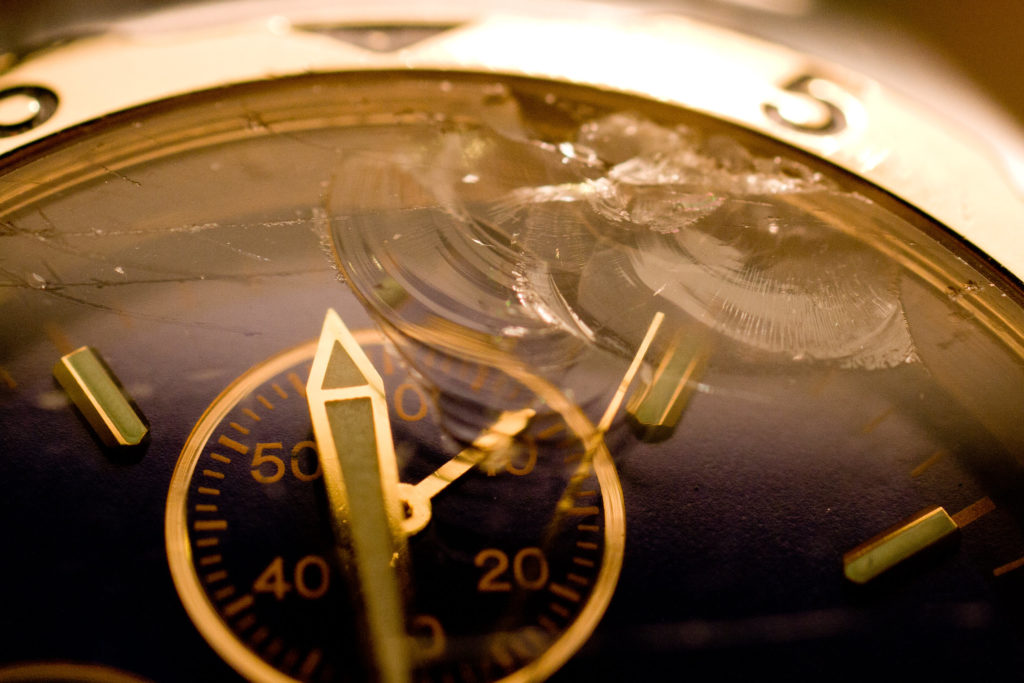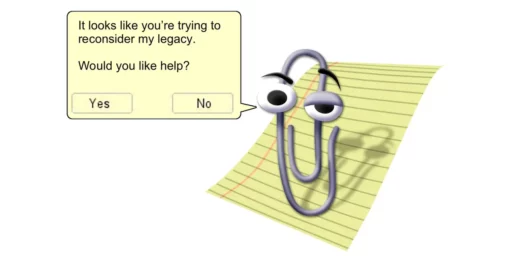Where Has the Decade Gone?
No one told you when to run, you missed the starting gun.

Katherine Miller has written an insightful, stream-of-conscious reflection on the nearly-over decade titled “The 2010s Broke Our Sense Of Time.”
The structure of the piece almost defies excerpting and I commend it to you in its entirety when, well, you have the time. But here’s a sampling:
This long and wearying decade is coming to a close, though, even if there’s no sense of an ending. People are always saying stuff like: Time has melted; my brain has melted; Donald Trump has melted my brain; I can’t remember if that was two weeks ago or two months ago or two years ago; what a year this week has been. Donald Trump tells the story of 2016 again. Your Facebook feed won’t stop showing you a post from four days ago, about someone you haven’t seen in three years. The Office, six years after it ended, might be the most popular show in the United States. Donald Trump tells the story of 2016 again. One high schooler dances to a Mariah Carey song from 2009 (“Why you so obsessed with me?”) in a video that loops in 15-second increments on TikTok; then other teens do it; then a high school dance team dances that dance to this Mariah Carey song as a gym full of teens sings along, in a video that loops in 15-second increments on TikTok. Donald Trump tells the story of 2016 again. What was here yesterday no longer is.
The touch and taste of the 2010s was nonlinear acceleration: always moving, always faster, but torn this way and that way, pushed forward, and pulled back under. As the decade closes with an impeachment inquiry, Trump drags and twists the entire country through six turns each day.
There is a certain discordance in modern technology’s shifting of the sense of time. Then again, as Miller backhandedly acknowledges, this isn’t entirely new. But it’s not old, either.
There’s more than one kind of time. You have your minutes and seconds ticking away, grounded in the Earth’s rotation and orbit. Paradoxically, given the lament of melting time, we’ve never had such easy access to this kind of precision on the subject. Knowing the time is relatively new to the human experience; the first cheap, reliable watch wasn’t made until the late 1860s, nor were there international time zones until 1884. But if you leave London and land in Los Angeles today, your phone will adjust and display in perpetuity the correct time in big sans serif numerals, no matter what you seek on the screen.
But, having gotten so precise at keeping us oriented to the clock, modern technology has paradoxically changed our relationship with time.
Take, for instance, television. We’re living through an incredible boom of great shows. Often described, with a weary irony, as the era of Peak TV, this wealth of programming followed tech and traditional premium broadcasters finally figuring out how to commercialize streaming platforms in the 2010s. As a result, you the viewer can move in any sort of direction, watching in bulk something that aired last year, or on Sunday, or one scene again and again, freed from the now-or-never quality that TV once had. For decades, TV either made or ran parallel to the rhythms of American life: morning shows, daytime soaps, the 6 o’clock news, the playoffs, Johnny Carson. In between, the broadcast networks aired 22 half-hour episodes, weekly from September to May, at a fixed time, winding away in sequential order at a mass scale.
[…]
At the beginning of 2013, Netflix released the entire season of House of Cards on one day, a choice received then as a novelty, meant to match the service’s reputation for users bingeing older shows. One night, at the end of that year, Beyoncé released a surprise album. By the mid-2010s, the convenience of paid streaming meant that you could pay Spotify or Apple $10 a month for, loosely, the entire history of recorded music. Hulu, HBO, Showtime, Amazon, Apple, and others have launched or relaunched streaming properties and brought online massive back catalogs of old shows. In September 2015, Apple relaunched its News app, and by early 2017, the service vastly expanded the number of people receiving news push alerts on their lock screens. News no longer arrives at any set time (in the morning, in the evening), or even on demand, but instead all the time, delivered by people and algorithms.
Again, this isn’t entirely new—but it’s new in a different way.
This kind of disruption happened often over the last century. In the 1930s, radio nationalized news, Westerns, and the Yankees, giving simultaneous access to FDR’s addresses and Edward R. Murrow’s reports from the Blitz. The rise of television killed the day game and the afternoon newspaper, and transformed entire industries and the presidency into staggering centers of power and wealth. “Television had changed the nature of the audience too,” David Halberstam writes of the 1970s NBA, “from a tiny handful of passionate fans who went to live games and paid real money, and insisted on real performances, to millions and millions of watchers, loosely connected to the game.”
But if you revisit the stories of 20th-century media and technology, they weigh toward centralization and consolidation — slotting the news, entertainment, and politics into the morning news, the late-night show, the weekly magazine on air or in print. As a result, when you pull numbers on the not-so-distant past, the commonplace becomes exotic: On May 16, 1996, 34.3 million people watched the season finale of ER — at the same time. To put that paradigm shift in context: For a brief period in 2017, the quiz game show HQ — a live trivia game with a real-life host on a phone app — became popular probably because it required users to tune in at the same set times, something now foreign. Now, the ER season finale in 1996 lives on the same plane as Lana Del Rey’s 2012 album and three different alerts of the same piece of impeachment news, a condition both freeing and overwhelming.
Joss Whedon, whose Buffy the Vampire Slayer played a major role in advancing TV beyond plot-of-the-week serialization in the late ’90s and into monthslong story arcs, has lamented the cultural shift away from weekly consumption and toward bingeing, saying in 2017 that without the time between, “We lose our understanding of narrative.”
He added, “I would want people to come back every week and have the experience of watching something at the same time.”
While there was no doubt something communal about that old-timey experience, it was also confining. While Joss Wheedan might want me to watch the narrative unfold at his pace, I prefer to make that call myself.
But, of course, technology has once again flipped that script on us, with time-bending effects:
As the 2010s went on, the platforms adopted the live and the disappearing and attempted to reach you with what you care about most — to make the experience less disorienting by focusing on what garners the most attention. During the 2016 election, Instagram added the ephemeral stories and shifted to an algorithmic timeline. “If your favorite musician shares a video from last night’s concert, it will be waiting for you when you wake up, no matter how many accounts you follow or what time zone you live in,” reads the corporate unveiling, a cheerful promise of permanent detachment from the clock in favor of what you (are thought to) care about.
Twitter had built its business on the ordered timeline, but it too introduced algorithmic weighting that same spring. “Someday soon, the tweets you see will be a little more interesting, and the tweets you miss won’t be as important,” a former Twitter employee wrote at the time. “And guess what: You won’t even notice. You won’t! You think you will, but you won’t.”
The new Twitter feed transformed how a user perceived something going viral; while a viral tweet used to get a few thousand retweets, it would now get tens of thousands — or even hundreds of thousands — of retweets. Powered by the new algorithmic weighting, the platform’s new quote-tweet function further turned Twitter into an ever-escalating, ever-nesting series of warring comments, dunks, and owns. Memes take hold, then disappear. One link of breaking news might hang suspended in your feed, hurtling through time like when astronauts do zero-gravity somersaults. You might see this as it happens — or 6, 9, 15, 22 hours later.
While this alleviates FOMO, it’s also jarring. Unless one pays careful attention, it’s easy to jump on a viral tweet from last evening 14 hours later without realizing one is doing so. And, quite frequently, I’ll see someone on my Facebook or Twitter feed share a story from 2, 3, or 13 years ago because it has gone viral for some reason or another, thinking that it’s new.
I tend to see most of this as either positive or neutral rather than negative. While there’s no doubt that the constant stream of information from our phones can be exhausting and disorienting, I mostly prefer it over the disconnectedness of even a decade, much less two decades, ago. But our relationship with time is constantly evolving, likely faster than our brains can adjust.






Another big part of this is two psychological factors that have always been with us:
1. People tend to lock in to their early adulthood as “the present” and consider everything afterwards as stuff that “just happened” even when they’re decades in the past.
2. People’s subjective perception of time goes faster as they age.
In short, it’s not technology that made the 2010s fly by, it’s our advancing age. ;P
@Stormy Dragon: Oh, I think that’s definitely part of it. Still, Miller just graduated college in 2010—making her 30ish. I’m not sure modern technology has so much speed up time but made it seem much less linear.
Not the last decade but the last two, I would argue, have been a revolution that easily rivals the industrial revolution for disruption. There’s a reason we’re seeing various iterations of social panic from people of rigid ideology, from jihadists to Evangelical Christians to anti-vaxxers. Science/technology/data are winning, superstition/religion/faith are losing.
Look at how the fault lines in this country follow the evangelical rejection of reality: anti-science, anti-gay, anti-trans, anti-choice, anti-poor. Each of these positions rests on religious beliefs. Each is easily refuted, in fact each is regularly refuted, implicitly if not explicitly, by the entertainment/information complex. Take the top ten TV shows – do you see religion there? Do you see anti-gay bigotry? Do you see the anti-choice POV? How about the notion of women subservient to men?
Everything from Avengers Endgame to Killing Eve exists in a world without the evangelical’s God. That’s not noticed by non-religious people, but it is by evangelicals. Where’s God in the fight against Thanos? Where’s male superiority in Killing Eve? Hollywood and Brooklyn creatives just sort of disappear those people and those beliefs. And that secular point of view is coming from firehoses with names like Netflix and HBO and Disney. It’s on your TV, it’s on your laptop, it’s on your phone.
As pointed out above, for the first time in history we always know what time it is. We also always know where we are. Precisely where we are. We have 24/7 access to all the knowledge of the human race, anywhere, essentially for free. That’s all amazing for clever, curious, adaptable people. But it has had a devastating effect on people who reject reality and cling to superstition.
There’s a lot of stuff in this piece that is well-observed, though the mention of the invention of clocks and watches was kind of a non-sequitur. Better would have been to mention the communal time indicators – church bells and clock towers chiming the hours. Which is precisely what has been lost, and fits her theme well.
I have so much in reaction to this, that I maybe should write a Medium post. Let’s just hit a few high spots:
* I was sending email in the 80’s. I played a frickin’ game via email in the 80’s and I submitted moves and conducted diplomacy over email in the frickin’ 80’s. So do not take anything I say as “old fogey hates technology”. Just nope.
* I have stayed away from all the stuff she highlights – Twitter, Instagram, Facebook – because I didn’t like what it did to me. I don’t want to be a slave to the immediate. I want to consume things, and then take time to digest things. My best thoughts are not always my first thoughts.
* I despise the algorithmic feed, because it shifts control from me, to the machine, and someone’s idea of what I am. An idea that is shaped by their desire for me to consume more advertising. My phone is a tool. I do not wish to be a slave to it. I am the master.
* I find the notion that I won’t even notice ridiculous. I noticed. I noticed a lot. The algorithm’s idea of what I wanted to see and what I actually wanted to see had some Venn overlap, but the algorithm had no notion of “stuff I don’t want to see, and could you please make it go away!” Nor did it have any notion of “low-frequency, often not interesting, but still important” that so many friends and relatives are. Most of their posts bore me, but I still want to see them, and not 6 hours later after everyone else has “liked” the news that a cousin is in the hospital.
* To continue that theme, our families and friendships are being exploited and damaged by this kind of interaction.
* Suspense is a foundational building block of drama. Having viewers wonder for a week about the implications of what happened and what might follow is an important tool. I often tell my daughter, who is a rabid Star Wars fan about how we spent two years between the release of The Empire Strikes Back wondering how the love triangle would play out, and whether Darth Vader was really Luke’s father. I don’t regret that, it was fun.
(By the way, I can respect the whole “I want to choose” thing, but I recommend that you choose slowing down. Digest the thing a little. Talking about it with friends/family is super enjoyable.)
* We are in permanent “feels” land. Everyone wants to poke me and make me jump because I just felt something. And yet, many of the best things in my life have come to me because of my ability to slow down, digest a bit, and analyze. Feelings are good. I’m not anti-feeling. But we need to put feeling mind and thinking mind in harness together, and that usually means slowing down.
@Jay L Gischer:
One of the little things I love about visiting Germany is they still do this–if you’re in any village with a church (which is all of them) or even a bigger city with a cathedral (which is all of them), they will still ring the time with church bells.
And if you’re ever in Nuremberg at noon, go to the main market (Hauptmarkt) and watch the Männleinlaufen, the mechanical clock show that depicts the electors presenting themselves to the Holy Roman Emperor in the 14th century. It’s fantastic.
It doesn’t have to be. you can manage the type and frequency of notifications.
Also, there’s no reason at all to have any social media apps on your phone at all. You can access the feeds, if you want, on the phone’s browser.
My phone doesn’t have Facebook or Tweeter (I never got on the latter). Mostly I check FB on the desktop PC at home, but also on the phone using the browser.
The only notifications I get are messages like Whatsapp, email (and just the work account), Pinterest (in digest), Audible (I forget to check the free originals on offer otherwise), and Waze. And the only one that makes a sound is the one for messages.
I don’t get notifications from other apps, not even the news apps.
It’s a bit of a chore to tame the notifications, but it takes only an hour or so. the downside, if you want to call it that, is you may forget about some apps. And you have to repeat the process every time you get a new phone, too; but that should be every couple of years or longer.
Now, I’m not very sociable, nor do I have many friends or family I care to keep up with, so YMMV. My engagement with work is limited, too. Usually if it’s something important, someone will call.
A decade ago, Obamacare was still more than four months away from being signed into law and providing me with the first health insurance I’d had in 6 years.
The past ain’t what it used to be. Neither is the future.
Looks like our Green Mountain Mama has vanished.
Maybe she fell off the peak of Mount Mansfield.
I won’t miss her.
My fingers were getting chaffed on the trackpad of my Mac Book Air from scrolling past her gibberish.
@Kathy:
Or, you can use your phone just to make telephone calls and send texts. Additionally, that practice may save you money in that you won’t need to spend several hundred dollars on a smartph0ne and buy a $100/mo.+ data package.
@OzarkHillbilly: A guy I worked with about 40 years ago used to say “It’s not like it was in the old days–and it wasn’t like that then either.”
I’ve noticed that culture seems to have slowed down since I was a kid in the 60s.
For example, in 1969, a movie or song from 20 or 30 years prior was viewed as old, antiquated.
But in 2019 movies from 1989 and 1999 still seem relatively current.
I think part of it is the rapid change of technology during the midcentury, where them quality of recorded media made earlier versions seem obsolete.
I spend lot of time at the local Buffalo Wild Wings. Besides the fact that chicken wings are my life I like to watch NFL on Sunday and this time of year the NBA.
The sound isn’t always on for the games and they play a music menu that spans from todays tunes all the way back to my High School Days. Class of ’66.
The help ranges in age from 18 to mid 30’s.
More than a few times I’ve heard them sing along with this song.
I get a kick out of twenty somethings asking
“what I want to know, where does the time go?”
@Just nutha ignint cracker:
That’s what I do least with my phone. On purpose.
Really, “phone” is no longer an appropriate description of these devices. But it’s more concise than “small, portable computers that make phone calls.”
I mostly use mine to play games, read books, read news, browse the web, navigate (Waze), listen to audiobooks and podcasts, watch TV and movies, and check email. The landline phone at my desk doesn’t do any of that. It only makes and receives phone calls.
I should mention I don’t spend much on the cel phones. First, the company issues the phone and plan and pays for it. Second, my mom changes phones every two years and lets me have the old one. All I pay in this regard is the broadband at home, which I would anyway phone or no phone.
@Mister Bluster: “I get a kick out of twenty somethings asking
“what I want to know, where does the time go?””
Sure, but Robert Hunter was only 29 when he wrote that song that song… (Or at least when they released it — he could have written it even earlier.)
@wr:..Robert Hunter was only 29…
Yeah. And I was 26 in 1974 when I lived in San Francisco about two blocks from Golden Gate Park. I would walk over there on Sundays and sing along with Jerry and the crew when they would play for free.
So I guess I’ve been asking that question for at least 45 years.